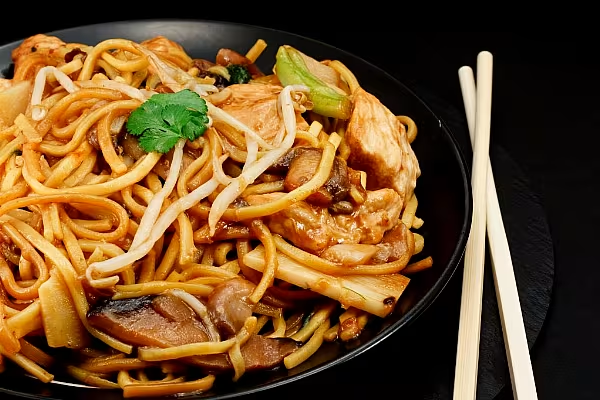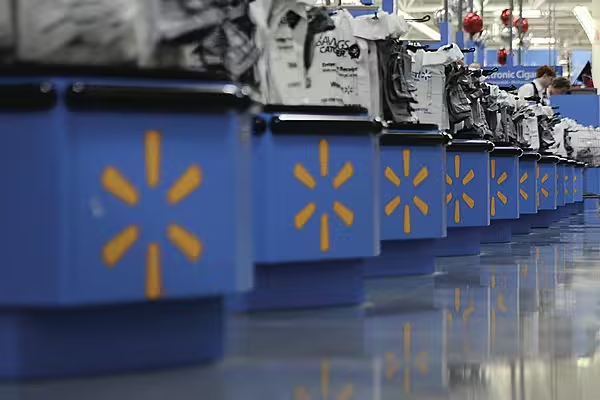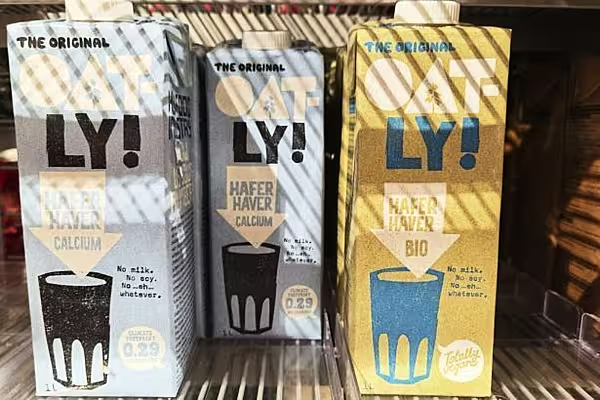The two-car train chugs out of Master Kong’s Dream Exploration Park in eastern China, filled with children giddy from shooting cartoon cabbages to dunk in animated pots of instant noodles. Next stop: A factory churning out 4,000 packets of the real thing every minute.
They may not inspire the same levels of awe as Shanghai Disneyland, but the noodle-themed playground and nearby assembly lines are propelling Tingyi (Cayman Islands) Holding Corp. into its own world of tomorrow.
The owner of the Master Kong brand makes half the 3.4 million tons of instant noodles eaten annually in China, yet revenue is stagnating as middle-class consumers abandon the salty, fatty cups for healthier options. Tingyi is on a mission to reinvent the humble noodle, pouring millions of dollars into customer education, food science, Olympic Games sponsorships and “Kung Fu Panda” movie shorts to convince diners the cheap meal can be part of their gastronomic aspirations.
“We want to continue to grow up, and ‘premium up,’ with our Chinese consumers,” Richard Chen, Tingyi's chief technology officer, said at the company's Shanghai research center. “In a couple of years, we will be able to reach the gold standard, which is when you can’t tell our noodles apart from what you would get in a noodle shop.”
Size of Market
China’s packaged-food market, valued at $226 billion by Euromonitor International Plc, is helping forge domestic companies that rival some of the world's biggest food giants, from state behemoth Cofco Corp. to dairy company Inner Mongolia Yili Industrial Group Co. and meat producer WH Group Ltd. But swaying Chinese taste buds may be easier than swaying hearts and minds. In a nation where even eggs and milk can be deadly fakes, consumers have become cynical about home-grown food and are willing to pay a premium for foreign brands they assume contain better ingredients and had to pass tougher safety checks.
The opportunity to charge premium rates and the shortage of domestic supply for products is pushing companies like WH Group and Bright Dairy & Food Co. to look abroad for ammunition to help them keep their noodles, pork and yogurt in kitchen cabinets and on refrigerator shelves.
Chinese companies have announced more than 80 overseas deals valued at about $12 billion in the food industry since 2009, according to data compiled by Bloomberg. That’s the year after at least six people died from drinking melamine-laced concoctions sold as milk. Yili said just this month it bid $850 million for Danone SA's Stonyfield brand.
“The food companies have been smartest in moving up the value chain,” said Shaun Rein, managing director of China Market Research Group in Shanghai. “They understand the fears and are going as high-end as possible.”
The biggest deal was in 2013, when WH Group acquired Virginia-based Smithfield Foods Inc., the world's largest pork producer, for $6.95 billion. Smithfield owns Armour salami, Smithfield bacon and Eckrich sausages, among others.
Having American brands gives WH Group a way to reach upscale consumers in the country that eats about half of the world’s pork, said Kenneth Sullivan, chief executive officer of Smithfield Foods and an executive director of Hong Kong-listed WH Group.
Consumption
Chinese per-capita consumption is 39.4 kilograms (87 pounds) a year, and domestic hog farms can’t keep up with demand. U.S. pork exports to China and Hong Kong totaled 545,000 metric tons last year, a 61 percent increase from 2015, according to the U.S. Meat Export Federation.
“There is a bit of a halo effect with the idea that the U.S. has very high food-safety standards and a high food-safety record,” Sullivan said.
As a result, Smithfield is considered a premium brand in China, with prices at least 20 percent higher than WH Group’s Chinese labels.
Smithfield can’t export sausage, ham and bacon from its U.S. factories because China prohibits imports of processed meat. So WH Group opened an 800 million-yuan ($116 million) factory in Zhengzhou that will produce 30,000 metric tons of those meats when it reaches full capacity next year.
“The whole idea was to incorporate the everyday protocols that we have in the U.S.,” Sullivan said.
One of the most active acquirers is government-owned Bright Food Group Co., based in Shanghai. China’s second-largest food company is recovering from scandal after its former chairman was sentenced in 2015 to 18 years in prison for embezzlement and bribery.
In December, listed subsidiary Shanghai Maling Aquarius Co. Ltd., a producer of canned meat, completed a deal for half of Silver Fern Farms Ltd., a New Zealand meat cooperative, for the equivalent of about $191 million at that time.
That capped a regional buying spree for the conglomerate that included New Zealand dairy company Synlait Milk Ltd. and Manassen Foods Australia Pty Ltd., which sells cheese, crackers, smoked salmon and other products.
In 2015, it bought control of Tnuva Food Industries Ltd. in a deal valuing the Israeli dairy company at about $2.16 billion.
“Walking out of China to use global food resources and the global food market can help us bring the best food technology into Bright Food, and can also be a channel to push out Bright Food’s domestic products to the world,” Pan Jianjun, a spokesman, said in an email.
The rapid expansion of China's food industry also brought casualties. Shenyang-based China Huishan Dairy Holdings Co., which once touted how it imported 250,000 cows into northern pastures to provide premium milk, rocked the Hong Kong stock market in March when its shares plunged 85 percent following an emergency meeting with creditors. Trading is suspended.
Noodle-maker Tingyi, meanwhile, is spending more of its money in-house. Innovators at the food giant once focused on practical advancements such as foldable forks and double-layer packaging so working-class Chinese could wolf down noodles on their commutes.
Now, they work out of a 500 million-yuan research complex in Shanghai, with Tingyi tapping the nation’s top food-science university programs and partnering with Japanese companies such as Itochu Corp. to develop chemical-free flavorings and palm oil-free noodles.
“The most advanced instant-noodle technology will be here in China because the potential of this market goes beyond anywhere else,” said Chen, the chief technology officer.Master Kong and his competitors seek to stem a 12 percent decline in China’s total instant-noodle sales since 2013 to 82 billion yuan, with a further drop to 62 billion yuan forecast by 2021, according to London-based Euromonitor.
Tingyi’s sales declined 23 percent from 2013 to 2016, and instant-noodle sales fell 10 percent last year to $3.24 billion from a year earlier, according to data compiled by Bloomberg. Sales of products including mid-end packets and snack noodles plunged 39 percent in the first quarter of 2017, compared with a year earlier, the company said May 22.
News by Bloomberg, edited by ESM. Click subscribe to sign up to ESM: The European Supermarket Magazine.














